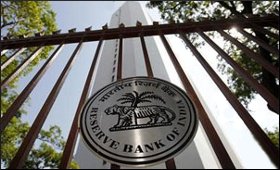|

|
RBI extends time to set up new banks
|
|

|
|
| Top Stories |
 |
|
|
|
SME Times News Bureau | 04 Jun, 2013
The Reserve Bank of India Monday extended the validity period of the in-principle approval it will give a promoter for setting up a bank from one year to 18 months.
Clarifying the Guidelines for Licensing of New Banks in the Private Sector, the RBI said it had extended the validity period as applicants, who want to set up new banks, brought out several complex issues relating to re-organisation of the existing corporate structure, restructuring of businesses and meeting the regulatory requirements.
"The queries received from intending applicants brought out several complex issues pertaining to re-organisation of the existing corporate structure, restructuring of businesses and meeting the regulatory requirements. In the above context, RBI has been requested to clarify as to whether it would provide more time for a smooth transition from the existing structures to that prescribed in the guidelines as also for meeting the regulatory requirements. It has therefore, been decided to extend the validity period of the in-principle approval from one year to 18 months.
"Accordingly, the provisions at para 4(K) (vi) of the guidelines stand modified. It is expected that this would provide sufficient time for the Promoters/Promoter Group to comply with the various stipulations in the guidelines and the terms and conditions that would be set out while granting the in-principle approvals to successful applicants, " the central bank said in a statement.
The extension of the validity period of the in-principle approval will ensure smooth transition from the existing structures to that prescribed in the guidelines as also for meeting the regulatory requirements.
Under the RBI’s new bank licensing guidelines, entities / groups in the private sector, entities in public sector and non-banking financial companies cannot set up a bank directly. They have to first set up a wholly owned Non-Operating Financial Holding Company, which will hold the bank and other regulated financial services entities/companies in which the Promoter Group has ‘significant influence’ or ‘control’.
After the approval is given, the setting up of the holding company and the bank, re-organisation of the Promoter Group entities to bring the regulated financial services entities under the holding company as well as realignment of business among the entities under the holding company have to be completed within 18 months from the date of approval or before start of banking business, whichever is earlier.
The holding company structure envisages holding of the bank and other regulated financial services entities of the Promoters/Promoter Group under it.
The holding company has to be wholly owned by the Promoters/Promoter Group and shares in it can be held by individuals, corporate entities and companies belonging to the Promoter Group.
The RBI clarified that companies in the Promoter Group, in which the public hold not less than 51 per cent of the voting equity shares, shall hold not less than 51 per cent of the total voting equity shares of the holding company.
Newly-formed Promoter Group would not be able to meet one of the ‘Fit and Proper’ criteria, which requires Promoters/Promoter Groups to have a successful track record of running their business for at least 10 years.
The RBI observed that essentially, the intention behind stipulating the track record criteria is that existing groups should set up banks and not groups set up for this purpose. However, it clarified that individuals belonging to the Promoter Group can participate in the voting equity shares of the holding company.
The central bank said applicants should approach the other financial sector regulators for bringing the entities regulated by them under the holding company. Their decision in this regard would prevail. Therefore, at the minimum, the proposed bank and all RBI regulated entities will necessarily be under the holding company.
The Reserve Bank of India released the Guidelines for Licensing of New Banks in the Private Sector on its website in February. Next month it had invited queries from intending applicants seeking clarifications on the guidelines.
In all, RBI has received 443 queries from 34 individuals/ organisations regarding Guidelines for Licensing of New Banks in the Private Sector.
|
|
|
| |
|
|
|
|
|
|
|
|
|
|
|
|
|
|
| |
| Customs Exchange Rates |
| Currency |
Import |
Export |
US Dollar
|
₹91.35
|
89.65 |
UK Pound
|
₹125.3
|
₹121.3 |
Euro
|
₹108.5
|
₹104.85 |
| Japanese
Yen |
₹58.65 |
₹56.8 |
| As on 19 Feb, 2026 |
|
|
| Daily Poll |
 |
 |
| What is your primary "Make or Break" expectation from the Finance Minister this year? |
|
|
|
|
|
| Commented Stories |
 |
|
|
|
|
|
| |
|